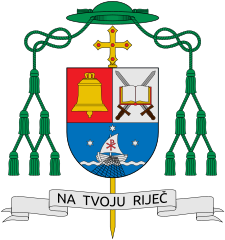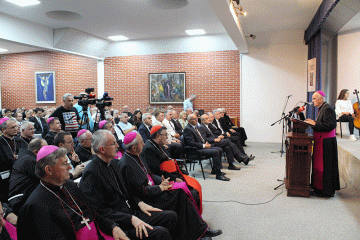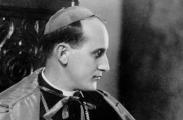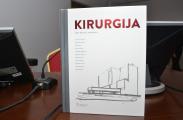First of all, I thank you all for your presence here this evening and greet all those that the Vicar General, Fr. Željko Majić greeted both individually and collectively, beginning with Cardinal Vinko Puljić.
An unworthy servant. Every day for 25 years now and sometimes twice daily on feast-days or Sundays, in the Eucharistic prayer I have prayed: “Be pleased to confirm in faith and charity your pilgrim Church on earth, with your servant” John Paul, or Benedict, or Francis our Pope, “and with me your unworthy servant”. With great hope, I pray to God and I sincerely believe that I am His unworthy servant; unworthy of the Holy Orders of the Presbyterate and even more unworthy of the Episcopate. Everything is a gift from God, for which I am grateful to the Lord. At the same time, it is a task that has been entrusted to me through the Church, as a test of the mind and freedom, that is, as a trial between the court of Gabbatha and the crucifixion at Golgotha. A task that one must respond to with one’s life, in the hope of resurrection.
Not only unworthy – but nothing. While aware of his exalted apostolic ministry, St. Paul nevertheless did not only write that he was unworthy, that amongst all sinners he considered himself the “foremost of sinners” (1 Tim 1:15), but he decisively wrote to the Corinthians: “I ought to have been commended by you. For I am not at all inferior to these superlative apostles, even though I am nothing” (2 Cor 12:11). Exactly this: though I am nothing – Tametsi nihil sum! This is our episcopal and apostolic definition. Nihil sum before God. However, since the most merciful God considered Saul “faithful” and chose him “for his service” (1 Tim 1:12), the Apostle gave us an example of how we should be grateful for God's infinite love towards us.
The appointment by the Pope. On 29 May 1992[1], when St. John Paul II decided to appoint me as coadjutor-bishop of Mostar and I was informed of this on 1 June, by Cardinal Tomko, Prefect of the Congregation for the Evangelization of Peoples, who sought my consent, I responded a few days later by saying that all the difficulties of that time and the consequences of war, deter me from accepting such a demanding ministry. Yet I added, that I would not want to go through life without the Pope’s apostolic blessing. And how could I earn his blessing if I were not to accept his appointment?
Through many persecutions. In accepting the decision of the Holy Father twenty-five years ago to become coadjutor to the bishop Ordinary Pavao Žanić, I took as my motto the words of Sts. Paul and Barnabas “It is through many persecutions that we must enter into the kingdom of God” (Acts 14:22) I chose this not only because the Church in Herzegovina – as well as in Bosnia and Croatia – had been affected from the outside by the war, with all kinds of hardships, but also because of the internal phenomenon of disobedience and the existence of some systematic falsehoods in the Diocese of Mostar-Duvno, aware that there are always present great adversities in the struggle towards complete obedience and the real truth. The answer to the first question was, among other things, the posthumous book by Fr. Marko Perić, Hercegovačka afera (The Herzegovinian case).[2] We sought to resolve this original “case” exclusively through the Holy See from 1993 to 2005.[3] It was concluded on paper in the year 2000 by the acceptance of the Declaration of Obedience, yet in reality, there remains some residue with a few censured priests along with their supporters.
The implementation and aim of the Pontifical decree Romanis Pontificibus, was to achieve justice for the diocesan clergy and the parishes assigned to them a hundred years ago in 1899. Here I would like to thank the Franciscan brothers and the members of the Franciscan General Curia, as well as those from the parishes who willingly accepted, as did others who came over time as newly ordained religious or returnees from foreign missions, who thoroughly accepted the implementation of “Romanis Pontificibus” thereby manifesting themselves as reliable associates in parish pastoral ministry for the good of the Province and this entire local Church.
The phenomenon of Medjugorje. Besides many public texts on the alleged apparitions in Medjugorje, the Chancery Office also published the books: Ogledalo Pravde (Mirror of Justice)[4] and Istina će vas osloboditi (The Truth will set you free).[5] I am quite convinced, as my predecessor Bishop Žanić was convinced, that falsehoods cannot be proclaimed as truths especially not in the Catholic Church, regardless of all the media hype and the current illusory triumphant claims. I firmly believe that true and authentic public devotion to Our Lady, the Immaculate Virgin Mary, cannot be built upon the sand of inauthentic apparitions! I'm deeply concerned that one day the entire truth will arise to the surface! And here I have advocated – as did my honorable predecessor – and I am still striving to defend the most holy person of Our Lady from human fabrications, and in this the Church must also be and remain “the pillar and bulwark of truth” (1 Timothy 3:15).
Regarding this phenomenon, it would be praiseworthy if we were all to let the truth of Jesus set us free from all kinds of earthly attachments and interests, and that we live in plena veritate et caritate – in complete Christian truthfulness and charity, thereby honoring the Blessed Virgin Mary in the way the Church’s Magisterium suggests and seeks from us.
The invented accusations that are so heavy and so defamatory regarding the “collaboration” of my predecessor and of my “agreements” with the sworn enemies of the Church, and this without any blackmail and supposedly at my request, must be confronted in another way and in another forum. I would only mention one thing here. For years before I was ordained, I accompanied at times Bishop Pavao, even at his encounters with the Holy See, where the not so minor scandals associated with the very beginnings of the so-called apparitions in Medjugorje were presented and discussed. I was a personal witness to the profound suffering of our dearly departed Bishop Žanić. And I often wondered why such a phenomenon, which presents itself as something fruitfully good and spiritually healthy, is so often endorsed at the general level with countless fabrications, deceptions, attacks and monstrous calumnies? Even now I ask the same question: whose work is this? And who needs this?
Expressions of gratitude. I am grateful to the Lord for this quarter-century he has given me to preach the Gospel by word and mouth, to administer Christ’s sacraments and to canonically guide the dioceses of Herzegovina for the greater glory of God, for the growth of the Catholic Church, for the salvation of souls and the good of the Croatian people. For all my faults and omissions, I humbly ask the Lord for forgiveness!
I am grateful to the Holy See who directly followed my work. Only to her did I made on oath of fidelity to, by placing my hand on the Gospel. Only to her did I give an account of my work. I only called upon her for help to resolve the inherited “case” and to elucidate the publicized “phenomenon”. Only to her did I send over 2700 documents on Medjugorje from the archives of the Chancery Office, in which hard facts are written that contain the truth. Every day I listen to stories in the media and from other sources that do not correspond to the truth. I have believed in and still believe in the words of Jesus: “Tibi dabo claves Regni coelorum” (I will give you the keys of the kingdom of heaven) Simon, son of Jonah (Mt 16:19). I have spoken with total parrhesia – with open and responsible freedom, and sincere respect before Popes, the Cardinals of the Holy See and other officials, and I also received their respect as well.
I am grateful to God for my faithful assistants at the Chancery and for the book: “Sjeti me se kada u raj dođeš!” (Remember me when you come into your kingdom) which they prepared for this occasion. I am likewise grateful to those priests ministering canonically in the parishes of Herzegovina, the religious sisters of various Congregations, as well as all the faithful, for their faithfulness to Catholic teaching, for their unity in Christian love, for their promoting spiritual life, for the renewal of the churches that were destroyed and the construction of new buildings.
I am grateful to all my brother bishops from both Conferences of Bishops that minister to the Church amongst Croatians, for our regular annual meetings and many others, as well as to the members of other Bishops’ Conferences for exchanging their fraternal invitations, their cooperation and understanding.
I am grateful to all those persons and institutions that are in the service of productive peace, responsible freedom, the creation of good interpersonal relations and the employing of the unemployed in this part of our homeland.
I have supported and still support contacts with the representatives of the Eparchies of Zahum-Herzegovina and Primorje, and the Islamic religious community of Herzegovina. These contacts are not at the level of lofty ecumenical and theological discussions; however, we do not want to extinguish the flame of common interpersonal exchanges and greetings for holy days. True ecumenism and dialogue has a future, but false ones do not.
At one point in the past I was quite ill. I am grateful to God who gives us health, who hears the prayers of faithful souls and makes use of excellent doctors and their expertise and humanity, and amongst all of them, I must particularly mention Dr. Mato Škegro from Zagreb. May God grant all of them, his many rewards.
I am grateful to all those who these past days have written or called, or who came to Mostar to thank the Lord our God together, from whom I joyfully invoke an abundance of His graces and blessings! Special thanks also to Cardinal Josip Bozanić, who called and sent a written message.
I am especially grateful to Pope Francis who for this occasion sent his personally signed message, which for me is a sure sign that for these last 25 years I have strived to work according to the Pope's apostolic blessing, which I emphasized in accepting this ministry.
Once again, I thank you for your presence and attention this evening, for your human and spiritual support. And as the Holy Father often says: “Go forward with courage” (Avanti, con coraggio!) May everything be in faith and love, to the praise and glory of the Holy Trinity!
[1] Annuario Pontificio 2017, p. 485.
[2] M. Perić, Hercegovačka afera. Pregled događaja i važniji dokumenti, Mostar, 2002.
(The case of Herzegovina. An overview of the events and important documents) Mostar, 2002.
[3] The official meetings with the Franciscan fathers from the Province and the General Curia, at the invitation of the Congregation for the Evangelization of Peoples, were held in Rome: the first in April 1993, the second in October 1995, the third in February 1996, the fourth in March 1997, the fifth in November 1998, the sixth in December 1999, the seventh in November 2002 and the eighth in October 2003. The Minister General signed the declaration Put zajedništva u Crkvi u Hercegovini – The Path to Unity of the Church in Herzegovina on 1 March 2005.
[4] Ogledalo Pravde, Biskupski ordinarijat u Mostaru o navodnim ukazanjima i porukama u Međugorju, priredio D. Kutleša, Mostar, 2001.
(The Mirror of Justice, The Chancery Office of Mostar on the alleged apparitions and messages in Medjugorje, edited by D. Kutleša, Mostar 2001).
[5] N. Bulat, Istina će vas osloboditi. Nepouzdanost izvora i nedoličnost poruka. Studija o nekim međugorskim pitanjima (1986.), Mostar, 2006.
(The Truth will set you free. The unreliability of the sources and the improperness of the messages. A study on some of the questions of Medjugorje (1986), Mostar, 2006).




